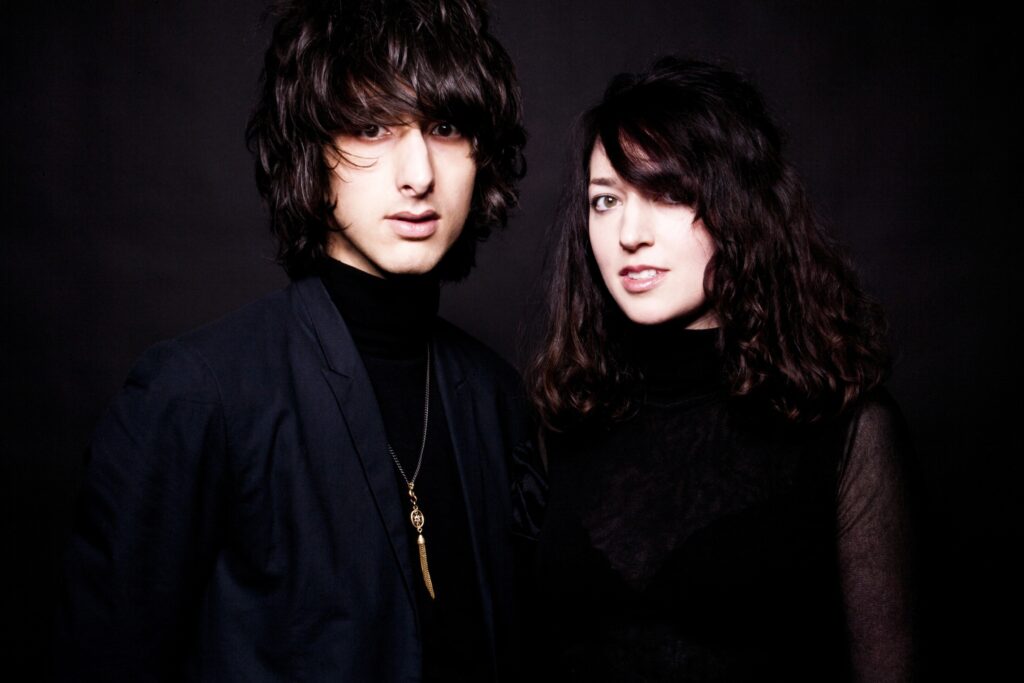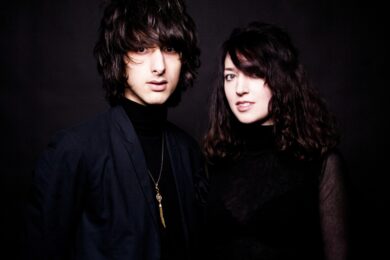Are they or aren’t they? That’s sure to be the question that dogs Cats Eyes, a musical collaboration between Canadian soprano singer Rachel Zeffira and The Horrors’ Faris Badwan. For both their ‘Broken Glass EP’ and forthcoming self-titled long-player (out April 11th) are records that get into a mild sweat with a curious, balanced dynamic, and a psychedelic, gothic sensuality. Although the project began as an attempt to record a contemporary homage to classic girl group pop, the end result has, perhaps without it actually being intended, ended up a far richer, broader, more considered affair. These opulent and dreamy love songs are arguably the most accessible pieces Faris Badwan has yet been involved with, and is further proof of his growing ability as both songwriter and collaborator. The Quietus meets up with Badwan – dark-eyed, serious – and Zeffira – fast speaking, proffering indecently rich, home-baked chocolate cakes – in a Camden café as they rehearsed for a series of gigs in churches. This follows their first ever performance, which somewhat bizarrely took place at St Peter’s Chapel, in the Vatican [see below]. So, Cats Eyes, with your strange brother/sister, boyfriend/girlfriend giggles and peculiar glances, how did you manage to pull off a gig under the Pope’s nose?
Rachel Zeffira: It was nothing to do with being gimmicky or trying to be different. For St Peters we liked the challenge of rearranging a pop song to fit into a mass setting. I think we wanted to do that for that. We weren’t sure if we’d be able to get in there and do that, and we both like challenges.
Did they take some persuading?
Faris Badwan: We didn’t really seek permission in that sense
RZ: They were happy with what we did, but we didn’t call up and say ‘we’re a new band and we want to launch at the Vatican’.
How did you approach it?
RZ: That’d be revealing some underhanded…
It’s a secret?
FB: It’s not a secret, but I don’t think… it took a lot of hard work by Rachel mostly.
RZ: They did think that maybe the song that we were singing might have been Psalm 23. They didn’t question it, or think anything weird was going on. We wanted it that way, we didn’t want to be disrespectful or cause a big sensation. It was a sombre, Latin mass, and a lot of cardinals were there, and a lot of people who are Catholic and come from all over the world and for them it’s important, so we didn’t want to be offensive.
FB: The challenge wasn’t just to sneak in, but what we were most interested in doing was making one of our songs fit in another context. We wrote the songs so that we could do that.
RZ: To make it sound sacred almost…
FB: They can fit into any number of places, and we just feel that we could reach such a wide range of people. We wanted to test that.
The music does sound filmic, atmospheric, and then to think of it in the context of the mass. I can imagine it fitting a lot of different scenarios.
FB: Yes, all our songs are like that.
RZ: They’re open to interpretation. That’s the ideal isn’t it?
FB: Yes.
What that how it started, this sharing of wide ideas?
FB: It’s when we realised what we both appreciated in music. We don’t like things to be spelled out, there’s no mystery or anything. I just feel that there aren’t many bands that let people take them as their own, that let people personally identify with for their own reasons. You have to let people find their own way and feel like a part of it.
RZ: At first I was completely mimicking the 60s songs and it completely evolved from there.
FB: It was more of a really basic challenge, ‘write a girl group song’.
RZ: It was all ‘ooo baby baby’.
Those are deceptively simple.
FB: Exactly, that’s the thing. When you get them wrong you sound like an idiot
RZ: But because they’re simple you can do more with the arrangements around it. You can do more if you keep the simple core of the song.
It’s interesting if you make the comparison with sacred music because a psalm is a very simple thing, but has been expanded upon from many different places.
RZ: From the avant-garde, Bernstein did them. The girl group is a similar thing. Faris sent me a CD of girl group songs I was completely unfamiliar with. I’d heard the Shangrilas before, and the Supremes
FB: You knew all the Phil Spector stuff.
RZ: Some of them vaguely, not as much as you did.
FB: They’re in everyone, those songs.
RZ: There were some really weird ones, covers of really interesting songs. There’s the one with the girl fight, where they’re all killing each other.
FB: What’s great about that era is they all did different interpretations of each other’s songs, so the same song will exist in loads of different forms.
Like a really glossy pop take on the folk tradition.
FB: Yes, and passing on the same message. From then we were just sending demos back and forth. Recording at home is new to me, I’ve been getting into it more and more, but it was mainly when you started sending me things it made me want to up my game a bit, it made me competitive.
RZ: And I’d want to as well. He’d send me one and I’ll send him two. It was good.
What made it click?
RZ: It just did, we didn’t have to think about it. You’d think it’d be really different from our backgrounds, but its really not.
FB: It’s more about our mindset, that’s the most important thing
RZ: And maybe respecting each other’s taste. All the musical knowledge that Faris has that I don’t, all the stuff that he knows about girl groups and tonnes of stuff that I’m pretty ignorant about. And maybe vice versae for some of my references orchestral stuff, country and western, heavy metal. He doesn’t believe that I like heavy metal.
What metal?
RZ: I like Slayer.
FB: Fuck off, this is my point about the indie name check – people say they like metal then they just say they like Slayer, the two go hand in hand.
RZ: I like the Black Angels.
FB: Stop!
RZ: [Laughs] I do!
FB: The first thing we did was record at XL for a bit. We’d spend our weekends doing it and I really enjoyed it. I was in with The Horrors recording or off on tour and when I came back we’d do it. I guess that’s when the best things evolve, when you’re enjoying it.
RZ: It definitely didn’t feel like work.
Do you feel like it was a good release from your other projects?
RZ & FB: Definitely
FB: With The Horrors my role is pretty set out. We’ve been in a band for five years now so we know what we’ve got to do, we know our roles, so it’s great to do something else. It’s all about being out your comfort zone.
RZ: We didn’t really have any plans until we’d recorded the album.
FB: We didn’t have a label, or anything like that.
RZ: All of a sudden we were at Abbey Road…
FB: Rachel just went ahead and booked an Abbey Road session before we had a manager or anything.
RZ: All my life savings, flung away. We didn’t think we’re going to do this really well, it was more that this would sound good with a full orchestra and Abbey Road is free in a few days. I have a friend in Manchester who’s in an orchestra and she brought all of her friends down and we just experimented and tried different things, just on three songs. We never had any serious plans.
FB: It’s a good job it worked out!
Was that element of risk exciting?
RZ: I just felt that we had nothing to lose, because a recording lasts forever.
FB: You always find a way of making it work.
RZ: Music is never a waste of money, whether its buying instruments or recording something the way you want to record it.
FB: It’s not worth making any sacrifices. I’ve always had a huge belief in the project. Even from that first demo you sent me, the vocal sound you used made me think I definitely, definitely want to do this. A lot of it is about keeping ourselves interested…
RZ: We get bored pretty easily, and we don’t like repeating things – lyrics, chords, anything.
FB: You see it a lot.
The music industry loves repetition.
RZ: That’s a pet peeve of mine.
FB: We want to reach as many people as possible without making sacrifices.
It’s perfect for a Radio 2 audience, it could go massive…
FB: I don’t see why not. It’s a not a risk, and it’s not weak because of that. It should appeal to a lot of people, the melodies are really strong.
What about the future?
RZ: We don’t want to force anything, we just want it to take its course
FB: Like a spoiled child…



